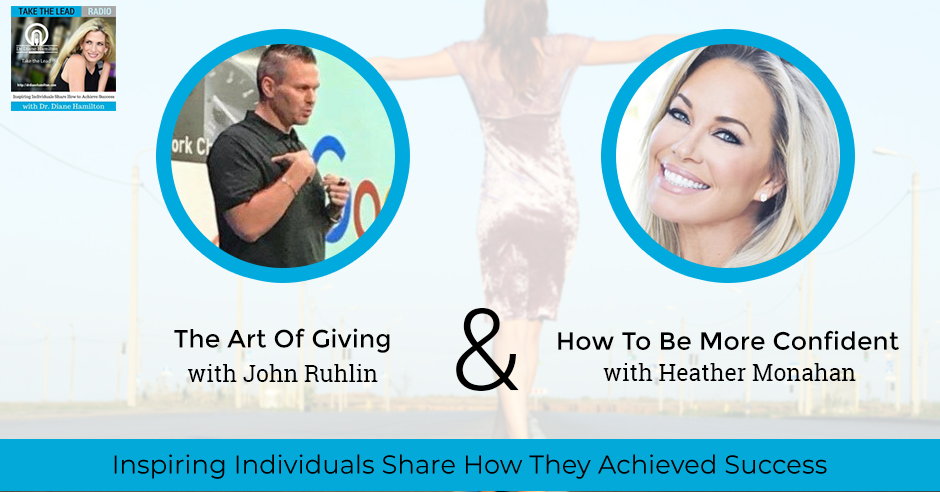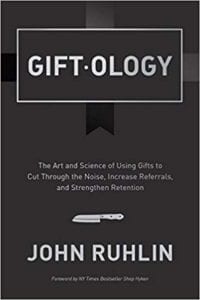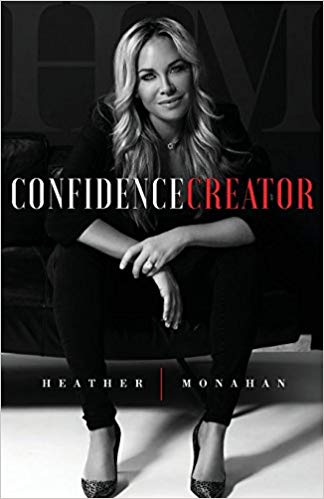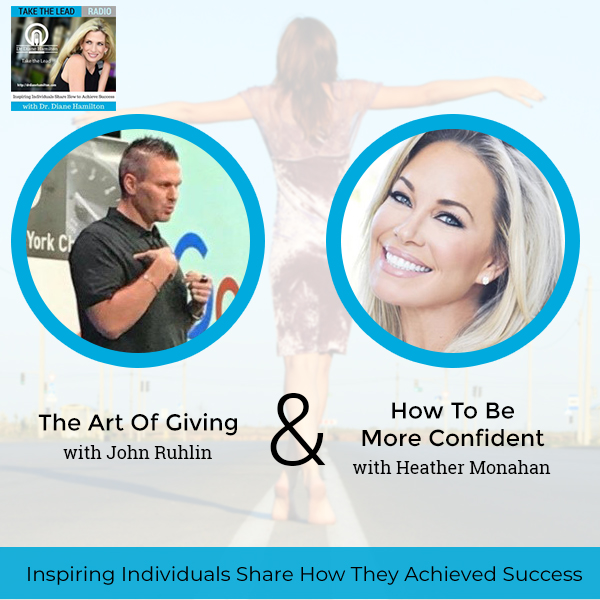
We have John Ruhlin and Heather Monahan here. John is a gift-giving expert. He’s the author of Giftology, a contributor to Forbes, Inc., and Entrepreneur. He has fascinating things to give people at work to open up the door. He’s got many great ideas. Heather is a Keynote Speaker at the Harry Walker Agency. She’s a bestselling author and her book is Confidence Creator. She has some great tips for what made her successful and how to be more confident.
Listen to the podcast here
The Art Of Giving with John Ruhlin

Giftology: The Art and Science of Using Gifts to Cut Through the Noise, Increase Referrals, and Strengthen Retention
I am here with John Ruhlin who’s the author of Giftology and contributor for Forbes, Inc. and Entrepreneur. He helps leaders not suck at showing gratitude. He founded the Ruhlin Group in college to market Cutco Cutlery as a high-end corporate gift to companies of all sizes. This partnership with Cutco has allowed them to become the number one all-time distributor of Cutco in their 60-year history out of over one million distributors and an active consultant to their executives and leadership. I am interested in chatting with you, John. Thank you for being on the show.
Thanks for having me, Diane.
Shep Hyken recommended you. He was a great guest on my show. I’ve also had some other people who you might know, Cameron Herold and others who have been on my show.
I researched you too and I was like, “Scott Gerber, he’s a good buddy and Bob Burg.” You’ve had some great guests and some mutual friends. We’re connected by quite a few different people.
After Shep was on my show, I went out and needed to get a gift for my son-in-law who’s a chef and he loves his specially prepared for you knives. They were a huge hit. I was looking forward to having you on the show. It’s nearly Christmas time and people are thinking about buying gifts and you might have some ideas that may talk them out of doing it. I want to get into that, but I wanted to get a little background on you. My husband’s from Cleveland, you’re from Ohio. Tell me a little bit more about your background.
I’m not a guy who was born hanging out in the country clubs in LA or New York. I’m a farm boy from Ohio. I grew up milking goats. I’m one of six kids on 47 acres. I was a kid that showed up at school smelling like goat milk. The whole blue-collar thing and I was like, “I want to get out of here.” I ended up going to school and I was going to go to med school. I had a mentor when I was interning at Cutco and he was an attorney. He was my girlfriend’s dad and he was a rainmaker. Referrals coming out of his ears and he was also radically generous. He was always giving things away. He was the most liked top of mind and trusted person. I pitched him the idea of giving away Cutco pocketknives out of desperation and I was like, “This is weird. I’m pitching my girlfriend’s dad knives for the second time in two weeks.” He got the little twinkle in his eye that he often did and he said, “John, I don’t want pocketknives. I’m thinking of great paring knives.” I was thinking all of his is clients are CEOs and executives of insurance companies, wealth management, real estate, and home builders. I was like, “How would you give them a kitchen tool? That’s weird.” He said something that changed my life forever.
He was like, “John, the reason I have more referrals, deal flow, and retention is that I found out if you take care of the family everything else seemed to take care of itself.” As a twenty-year-old farm kid with no real business background, I was like, “This is a big deal.” Paul understands relationships and reciprocity and all these things that I didn’t understand at the time. I started to pitch this idea and I started to tow in meetings with $200 million CEOs. By the time I was a senior in college, I’d started to get referred to professional sports teams. I’d put the med school on hold permanently. I built a company around the idea of how to use gratitude and gifting as a way to drive referrals without asking, as a way to increase your retention, as a way to get access to billion-dollar companies. That was over a decade ago and I’ve never looked back. We have million-dollar companies that will hire us to do all their gifting, solopreneurs. We have companies and organizations like the Chicago Cubs will hire us to outsource all of their gifting needs for their most important relationships.
[bctt tweet=”It’s not the thought that counts. It’s the thoughtful thought that counts, and gift cards are one of the worst. ” via=”no”]I was interested in your stories that you were telling about how you listened to Steve Wynn speak. You went to the EO meetings and there were certain people you wanted to meet. You heard Cameron Herold speak and that’s what made me bring that up. I saw Rich Karlgaard and he calls Cameron one of the best speakers he’s ever heard. He’s an impressive guy and I’ve met him at Genius Network events and different things. You were trying to get his attention. Would you mind sharing your Brooks Brothers story?
It’s probably more than a decade ago. I got recommended to join EO. I was barely qualified. I went out to this event out in Vegas and I heard Cameron speak and I was blown away. I almost did go to the breakout but when I went in it was standing room only. I was like, “I can’t afford a $10,000 or $20,000 a month coaching and consulting but I want him to be a mentor, an adviser, a friend, and an advocate.” I found out he was coming to Cleveland and I found out he loved Brooks Brothers clothing. I ended up talking to my business partner. He thought I was insane at the time. I went to Brooks Brothers, I found out his sizes. I bought one of everything in the new fall collection, all the jackets, pants, suits, belts, shoes, and everything. I outfitted his Ritz-Carlton Hotel room to look like a Brooks Brothers store. It was $7,000 worth of clothes. My business partner thought, “He’s going to think you’re a stalker. He’s never going to show up to the meeting. This is going to blow up in our face.” It was one of those days where his flights got canceled and missed. I’d invited him to go to a dinner and a ball game, a steak dinner and it was opening night for the Cavs. I realized when I’d invited him to that specifically that I was like, “He could give two rips about a dinner and ballgame because everybody goes to dinners and ballgames. In business, that’s the normal playbook.”
When he went up to his hotel room and he came back down 25 minutes later, he said, “John, I’ve never had anybody treat me this way. I’ve texted pictures to authors to change my quotes for their books. Whatever you want to talk about for as long as you want to talk about it, I’m all ears.” I’ve sent him probably 100 gifts over the last several years, but he has done things for me that $10 million in advertising couldn’t do. The reason we can charge $25,000 and $30,000 as a keynote speaker is because early on, before anybody knew what Giftology was or knew what I was doing, he would refer me to event planners. When he was double-booked, he’d be like, “You’ve got to talk to John Ruhlin. This is the guy you should have a keynote.” They’d be like, “Who is John Ruhlin?” He was like, “Trust me.” I land my first $10,000. My first $15,000 speaking engagements were because of Cameron and all of his clients he would give gifts to. He’s referred me probably to 200 people in many years. Most people have never gotten 200 referrals in their life, let alone from one person. The Brooks Brothers $7,000 investment paid off pretty handsomely.
You talk about personalization matters and timing and how to focus on what people want. When you said that about the game and the dinner and all that, it reminded me of when I was sales. They always give things that I didn’t want like this motivational thing. I had my own Suns tickets and they would say, “If you get this number of calls, you can have Suns tickets.” I was like, “I have that. I don’t need them.” I didn’t even want to go to one because I didn’t have time. They tend to give gifts that are simple or sound good, but how do you know what people want? You got a chance to ask Cameron what he was interested in when you asked him to dinner. He said he was going to go shopping or whatever. How do we get to know that?
You can research it or you can ask. One of the things I talk about is the inner circle. It didn’t start out this way. I started with $1,000 a month and now we’ve owned us by $400,000 this year on gifts to our relationships, me personally. 75% to 80% of the gifts I send out are not targeted at the executive because they’re getting the tickets, you’re talking about in dinners and Broadway show tickets. They fly first class, they go to nice hotels. They get dinners all the time. People know if they’re into wine or getting wines sent to them all the time. I take care of people’s inner circle with 80% of my budget. People are like, “What are you talking about inner circling?” I’m like, “I take care of their spouse. I take care of their assistant and their team. I take care of their kids and their pets,” because $100 invested there is like investing $10,000 into the executive. Oftentimes, they’d never received a gift that was related to them. I work in a lot of male-dominated industries where it’s a bunch of married dudes. Their wives get treated like arm candy, like a pawn, or nothing. One of the reasons to this day that we still do millions of dollars in knives is that almost everybody eats. They host, they’re in their foodies. They’re gathering.
The people’s kitchens is the hub and the intimate part of the house. I can send out a thousand knife sets to a thousand different addresses to a thousand executives and because I included their spouse’s name, the family name, and I included the whole family, people are crying. I’ve had people come up to me and they were blinged-out by $500,000 in diamonds, they were like, “In 30 years in businesses, this is the first time anybody ever included me in the gifts.” I was like, “You’re crying over knives? This is weird.” It’s not about the knives. It’s not about it being world-class and personal, but it’s about what it represents. It represents respect, thoughtfulness, and inclusion and all these things that most people in business are like, “Can we order 5,000 jackets with our logo on it?” I’m like, “No. Nobody wants to wear your logo first off.” We won’t allow people to put logos on gifts. Second off like, “You think that they’re going to want to wear the jacket that you picked out for them? You think you’re creative because you give them an Under Armour jacket? They can buy their own Under Armour jacket if that’s what they want.” Looking like the hero to their family, that’s a big deal.

The Art Of Giving: If you take care of the family, everything else seems to take care of itself.
A lot of people give my husband gifts because he’s a plastic surgeon and then they’ll be so happy. They’ll give him a gift card to a massage or whatever. He hates to get massages and so I get all of them.
The whole gift card thing, in this case, it works out well for you but he’s probably thinking like, “These people don’t know me. Why are they sending me something I don’t even like?” We have the ten worst gifts to give and gift cards are on them. It’s like, “A piece of plastic that you have to go buy your own gift? That’s not thoughtful.” It doesn’t make zero sense and people are like, “It’s the thought that counts.” I’m like, “No, it’s the thoughtful thought that counts and gift cards are one of the worsts.”
I saw the knives because I was at my daughter’s house. I went to visit them in Northern California. Those are pretty cool knives. Shep had said he kept the ones you gave him. It was cool to see the engraved part of it. The engraving was a nice touch. You’ve got probably many great ideas and a lot of people are thinking Christmas is coming up. They want to buy gifts. Maybe it worked for somebody to get noticed with their customers or to help their employees show their gratitude. You mentioned that Christmas isn’t necessarily a good time to buy gifts. Why is that? Who do you mean shouldn’t be buying for?
Most people do gifting out of obligation or they do it because they think they feel guilty like, “We made money this year. I guess we should say thank you.” Didn’t your mom teach you to say thank you all the time year-round? Most people’s tables and conference rooms are probably ready to collapse from all the candy, nuts, gift cards, fruit baskets, wine bottles, bourbon, and salami. People give the same gifts at the exact same time. For my budget, the $400,000, I won’t allow my team to send one dime between Thanksgiving and Christmas because it’s the most cluttered time of the year. As a small business owner, whether I’m working with a million-dollar company or a billion-dollar company, I’m like, “I want you to give me $1 and I want to give you $5 back in value.” I can’t do that if we’re trying to compete with 50 other gifts.
If I lay out a plan, I’ll tell people like, “You want to send gifts? Let’s pay for it now and then in 2019, let’s do gifts in February. Let’s do some gifts in April. Let’s do some gifts in August.” At times that they’re not expecting it because the timing does matter. If you give a gift after a referral, people feel like, “You’ve turned that referral into a transaction,” so we don’t do referral gifts. We give a gift at Christmas and it’s like, “They’re Jack-in-the-box. They feel like they have to do this,” and they’ve opened 40 other packages. Most of the time, gifts are getting re-gifted, given away to other people, or thrown away because you can’t consume all the crap that’s been given. Even a bad gift given in the middle of March is more impactful than a good gift given in December because it’s one of the few things that showed up in March. Timing is as important as the items that you’re sending.
Speaking of items, what are the coolest gifts that you’ve sent? What stands out in your mind as what has made the most impact?
[bctt tweet=”Timing is just as important as the items that you’re sending.” via=”no”]The knives are still number one even after many years. People come out to say, “What’s the cool gift?” I’m like, “People are still eating and they’re still hosting, so the knives are still.” Being able to personalize it to somebody is massive. The packaging is another thing. No matter what gift you’re sending out, it has to come with a handwritten note. If you think you’re just going to mail stuff out from Amazon or have some typed message, you’re trying to invoke an emotion and a feeling. I used to make fun of mugs as being one of the worst gifts. An artist made a $600 mug for me and for my wife and people are like, “How could it cost $600?” I’m like, “They had it handmade.” It took three weeks to make. Carved into it were my whole life story and my wife’s whole life story of her on the farm with her dad who passed away many years ago with cancer. They’re called Artifact Mug. Go to ArtifactMug.com. You can see what they make. This artist drove nine and a half hours to hand deliver these mugs to me and my wife. I’m in tears and my wife is in tears. I’m like, “That’s such a brilliant thing.” A high-end mug for most people is $10. It’s an artifact. It’s their legacy. It’s like winning the Oscars.
I love things like that because they get used every day. If I give something that’s used every day for ten years, that’s 3,600 thoughts, memories, and impressions reminding them of their relationship. People ask like, “How did you get so many referrals?” I’m like, “People think about me and Giftology every day, whether they want to or not.” I’ve had some people email me like, “John, I used the knives and my wife uses the knives or the mug. Whether I want to think about you or not, I’m thinking about you.” If you’re top of mind and you’re liked and trusted, my mentor Paul, the attorney who I learned a lot of this from, you’re going to get talked about over dinner. You’re going to get talked about on the golf course or when people are hanging out at the office because there’s that tangible trigger. I love things that are in the kitchen, so we do these cool glasses that are handmade from reclaimed wine bottles. They have a cool green story but they’re also practical and useful. People have never seen before.
One of my other favorite ones is called a Code38. It’s a wine tool that costs $400 or $500. People are like, “That’s insane.” I’m like, “You’ll pick up the bar tab for $500 and nobody remembers a week from now. I’ll buy one person a $500 wine tool and they’ll be thinking about me for the next 50 years. Every time they open up their $50 bottle of wine, they’re using my tool.” There’s that tangible trigger reminder of, “John Ruhlin gave me this.” I love those things that are best in class and a category where most people have a lame version of it. I go and blow it out of the water with the knives, the mugs, the glasses, and the wine tools. Those things have remained our top gifts for a long time.
I’m curious on the coffee mug though. What is that made out of? I’d be so afraid of breaking that.
I’ve seen billionaires cry and some people will put it on display. It’s made to be dishwasher safe. It’s made out of clay, but they fire in a kiln. I’ve dropped mine before and it survived drops. If you drop it on the tile it’s probably bye-bye. Most people’s cupboards are filled with mugs, but you can only drink out of one at a time. If you have a favorite that makes you tear up every time you see it because of what it represents, you’re going to grab that one because of the meaning behind it. This is more thoughtful. I have a Rolex. I have all these expensive things. They think it’s about the money and it’s not about the money, it’s about the thoughtfulness, the personalization, and the emotion that it invokes. People are like, “You have to spend stupid money.” I’m like, “You have to spend some money. If you do it well, you can spend less money than what you’re currently doing on your other relationship-building and marketing activities. You have to redirect it and do it well, not do it half-baked as most people do.”
You’re the author of Giftology. Do you give other ideas in the book? What can we learn from that book?

The Art Of Giving: Giving expensive things is not about the money; it’s about the thoughtfulness, the personalization, and the emotion that it evokes.
The book was written on asking. People kept asking like, “John, come to speak or come whatever. Can we get your playbook?” We walk people through the entire methodology of if you are going to use gratitude and gifting as a 10X return on investment. If you are going to use it as a strategic advantage in your business, here’s the playbook. Here’s how you have to think about it. Why does gifting matter? People want to start with what they’re going to give first, I’m like, “What you give doesn’t matter if you don’t have the who you’re giving to right.” I walk people through who they should be giving gifts to. What your budget should be. For us, it’s a math equation. It’s a reinvestment of 5% to 15% of net profits of our entire business reinvested back into our relationships. It’s not just clients, it’s suppliers, vendors, partners, and centers of influence. It’s people in the media and podcasters. We lay out, “Here are all the people that you could be or should be. It’s not just prospects.” People get excited to go after whale hunting for their new prospect. I’m like, “If you take care of your one market well, you wouldn’t have to prospect often because you’d have your entire group of clients.” For me, I don’t have salespeople. I have hundreds of clients that are salespeople for me.
This is how you turn them into a salesperson for you and get them to advocate for you. We walk people through the mindset, the heart set, the entire playbook of what to look for and how to source it. Oftentimes, people get to the end and are like, “John, I love this but this is hard. I tried to do this on my own and I’m missing great things. I didn’t know what to write in the note.” I’m like, “That’s why we have Giftology. You could do it on your own. It’s not rocket science. If it’s too difficult or if you want to outsource it and go focus on only the things that you can do, you can outsource to one of our Giftologists. Once you give us the data, we’ll do all the work for you and send out the gifts for you.” There’s no Giftology Two coming out so it’s not like we withheld half of the equation. It’s like, “If you buy my course or if you buy my whatever, literally the entire playbook is in the book.”
[bctt tweet=”It’s so important to show up for things because you never know what connection point can create another opportunity for you. ” via=”no”]I have a lot of people who read the blog who are consultants. They want to get in with the people, maybe CEOs, C-suite at large companies so they could become speakers or consultants. Do you have any advice on what they should do to open a cold door?
The long-term play is to take your warm market and turn them into advocates for you. Take all of your past engagements and your past event planners that hired you, CEOs, their assistants and their spouses and start reinvesting a percentage of your current revenue back into your current relationships. Get them to advocate the cold door because five words from a current client to appear will mean more than a gift or anything that you’re going to do. If you are going to do a gift for somebody that is an executive who’s making six or seven or eight figures, don’t go cheap and don’t just do one thing. Do your research. Go all in. Take care of the inner circle. Follow the playbook that we have. In our opinion, it’s better to go after ten people who are prospects and go all in on those people and maybe invest $2,000 a prospect or $1,000 a prospect.
What most people do is they do their book mailing or whatever mailing and they send it out to 1,000 people and they’re like, “I don’t understand. I’m not getting doors opened.” I’m like, “It’s called a shock and awe campaign for a reason. You have to shock and awe them.” Jeffrey Gitomer was a big sales author who I wanted to get his attention. I sent him eighteen gifts in a row over eighteen months before he invited me to his house. That’s the shock and awe campaign. Sending a box of cookies or a shoe and saying, “I want to get my foot in the door,” one time to somebody is oftentimes not going to work to get your most important people’s attention. Doing something twelve times over twelve months to your top ten and investing at the right level, you’re not going to close 100%. You’re going to get on their radar and be more likely to get the appointment. At that point, you have to sell yourself but getting that initial appointment is everything.
I had a person who deals with PR and that showed me a campaign where she had the book and it was all wrapped in this fancy box. It wasn’t a book, it looked different. I know you could put in leather bags and different things. What’s the best way to send a book?
The original books I did for clients, mentors, and people I admired from afar like Seth Godin, Gary Vaynerchuk, Gitomer, and all these people. We had handmade 50 books inside leather bags inside a linen box and they were $200 apiece. People bugged out. They brag about their book being $0.10 cheaper than somebody else’s and I’m like, “This is supposed to be your Bible. This is your life’s work and your bragging that you got it a dime cheaper. That is the dumbest, most idiotic thing you could say.” I have 30,000 books every week that is published on Amazon. I want it to be the nicest book anybody had ever seen. They’re all personally monogrammed to them and their spouse. Michael Hyatt, who gets 5,000 books sent to him a year said, “John, I was the CEO of a publishing company for a long time of Thomas Nelson. This is the nicest book in many years that I’ve ever seen.” He bought twenty copies without me knowing about it on Amazon for his twenty employees. He has on his podcast and in his magazine. The same thing with Darren Hardy, the publisher of Success Magazine said, “John, this is the coolest, most VIP book I’ve ever seen. I’m going to recommend it.” He mailed it off to all of his CEOs that he’s coaching and consulting with.

The Art Of Giving: Go all in where most people go cheap. It shocks people.
People are like, “$200, that’s dumb,” and I’m like, “You’ll spend $200 on a dinner with one person that they’ll forget. I’ll spend $200 on a book. I’ll do it for the top 50.” I don’t pay $200 apiece anymore. I order 1,000 at a time. To this day when I mail out a book, I don’t care if it’s to a secretary, an assistant, somebody I met on an airplane, that’s the book I send. People freak out. They post about it. Influencers get excited to send the book to other people. I’m like, “This is the best.” Where everybody’s going as cheap as possible, I ask myself, “How expensive can I go and make it?” What’s the most I can do? It’s one of my principles I learned from my mentor. You go all in where most people go cheap. It shocks people. We do with our letterhead. Our letterhead is a sheet of steel, it costs $9. People think we’re idiots. I’m like, “You’ll spend $9 on a flashlight that’ll end up in the trash can in three months. I’ll spend $9 on a handwritten note and people will frame it and show it to 1,000 people. Who’s the idiot now?” I’m all about the over-the-top packaging for sure.
That is the best advice for people and I’m sure so many people want to find out how they can get in touch with you and learn about more about what you’re doing. Can you share your website links or anything you want to share?
I would say that one of the things we walk all of our clients through is the ten worst gifts to avoid giving. We get a white paper then talk about why wine, why food, why gift cards, and why even Apple is one of the worse gifts to give. If people don’t want to go buy the book, they want to download something to take to their team. At least have some guidelines on how to be in the top 5% of gift givers, they can avoid these ten. If they go to TheGiversEdge.com they can download the white paper for free. They can also get some of our behind the scenes tips, secrets, and things like how do we package our book and where do we get the $9 letterhead and all of these other things. The ten worst gifts to avoid giving if you want referrals and doors opened is a core part of our offering. If you want to check out what we do from a speaking or consulting, like for the Cubs projects and stuff, you can go to Ruhlin Group or JohnRuhlin.com. Both of those have examples on some of the things that we’ve done. The TheGiversEdge.com is our core hub.
John, this was so great. I enjoyed this having come from a sales background and many decades doing this. This is an impressive stuff. Thank you so much for sharing.
Thanks for having me.
You’re welcome.
How To Be More Confident with Heather Monahan

Confidence Creator
I am here with Heather Monahan who is a keynote speaker at the Harry Walker Agency and bestselling author of Confidence Creator. She is recovering from corporate America and she is out promoting her book. It’s nice to have you on the show, Heather.
Thank you so much for having me.
When you say you’re recovering from corporate America, maybe I need a little background on that.
My entire life, my whole career has been corporate America. In July 27th of 2017, I was unexpectedly fired when the founder of the company I worked for at the time became ill and he promoted his daughter to the CEO position. I was the CRO and she had always disliked me. When she was able to finally take over, she brought me in and terminated me. That day was definitely a tough one, but it did give me the opportunity to make the decision to go out on my own and become an entrepreneur which has been a wild ride.
I’ve been watching you on LinkedIn and you have been doing a lot of book signings and a lot of things. You’re right up in everybody’s top lists of things. I’m trying to figure out why she would dislike you? Was it just she wanted that job?
Have you never worked with an insecure woman?
Sometimes there’s no rational reason is what you’re saying.
When I first advanced to the C-suite which was a few years back, I launched at that same time I had one of those epiphany moments where I realized, “There’s got to be more than just work and raising my son. I’ve got to have more of a purpose.” I decided at that time to launch my personal brand and using the #BossInHeels to share what it was that I learned from growing up poor to getting ahead and making it in corporate America. How did I break that glass ceiling? I wanted to pull that curtain back and share those insights with everyone. I didn’t want it any longer to be reserved for the people who are wealthy or had wealthy parents. I launched my personal brand and when I did that it angered at that time the CFO who ended up becoming the CEO. She hated my personal brand. She told me to shut it down. She didn’t like it. It became a real ongoing problem for me while I was at the company.
It’s tough when people don’t want you to succeed or whatever the reasons are. There’re always going to be some issues. You talked about breaking the glass ceiling is what you wrote about. Do you have advice? How did you do that?
One of the ways I was able to elevate myself to the level that I reached which was the highest position in the company other than the CEO position and that started for me with pitching opportunities that didn’t previously exist. I built my name in sales and in sales leadership by doing things like that. Other people would say, “This has never been done so it’s not going to happen.” I would see opportunity, connect those dots, and put myself in the position of that other decision maker and think, “Why would this benefit them?” At a young age, I orchestrated my entire career from that regard. Ultimately, when I got to the to the last company I was with, I pitched myself for a job that didn’t exist which was VP of Sales of the company. After I did that a few years, I pitched Executive Vice President and that didn’t exist. Ultimately, I pitched the Chief Revenue job which didn’t exist either. Each time I was able to show them what my accomplishments had warranted. Why it made sense for the company and how they would benefit from each one of these opportunities if they would agree to create it and each time they did.
[bctt tweet=”Whenever you spot one of those people that seem so perfect and so full of themselves, know that that person is the most insecure person.” via=”no”]Would you go back to corporate America or are you completely finished with that?
One thing that’s nice about corporate America is your paycheck, you have the safety. Because I had operated in that space forever, that’s all I ever knew. I had never gone out on my own. Now, what’s interesting is I love what I’m doing because I worship my boss. I have the best boss ever and that’s me. What’s great about me as a boss is I love to innovate. I like to take risks. I like to see opportunity and go after it no matter what. I was held back so often when I was in corporate America and not allowed to innovate and do the things I wanted to do. I don’t miss that part at all. However, every day you are driven from that excitement or fear of not having that guaranteed paycheck and having to create that momentum. Fill the pipelines and have revenue coming in all the time because you have yourself to rely on. I don’t want to go back to corporate America. I’d like to stay as an entrepreneur and make my company a larger company and employ more people and make this a company that maybe at some point I take to corporate America. I’d like to continue working for myself.
You and I do similar things in the fact I’m an author and a speaker and some of the things that you do, I do. I understand what you’re saying because I was in sales forever. Even though commission sales you still have the same thing. You don’t know the paycheck is coming. You talked about being held back from innovating. That’s what I focus on in a lot of the things I talk about with my work with curiosity because a lot of companies aren’t allowing people the curiosity to explore things that they should. Why do you think that you were being held back from innovating?
Now that I’ve taken a step back from corporate America and the situation that I was in, it was a toxic environment where they were so focused on scarcity and cutting. That was the solution. Let’s find ways to cut. Who can we fire and give someone else that job and have them double up on workload? When you’re in an environment like that, where you’re not looking at how to grow and reinvest, it for me was unhealthy. I don’t see that being a great strategic long-term play for any company. When you’re in that environment, it becomes the norm that people don’t want to take risks. They’re afraid. That scarcity mindset creates a fearful culture. People are applauded for not taking risks and instead applauded for taking on additional jobs and killing themselves for work as a way to try to find more cuts for the organization.
I’ve seen a lot of that and it’s defeating because if they could take the risk, they would be able to get out of that hamster wheel. You talked about a lot of interesting things about how you’ve come from a modest background and created all this. That ties into what I’m interested in and the curiosity aspect. What led you to be curious enough to get past that level of what other people maybe with whom you grew up? Maybe they didn’t go any further. What do you think was the thing that made you more curious than others?
I don’t even know if it was more curious. I was always more driven than most people. Something that has brought up to me still to this day very often is that my drive sticks out to people as unique. Growing up without gave me this incentive to not be without again. I used to think even as a child, “How can I create a situation such that I’m not struggling?” At a young age, I started a paper route and then I started working at fast food restaurants and then waiting tables. I learned early on if I can work hard and outwork everybody else, I won’t have to struggle.
That brings up what you write about. You write about confidence and that builds confidence. When did you decide to be an author?
[bctt tweet=”One of the keys to success with book sales is having that next book coming out.” via=”no”]I was fired July 2017. That first week after it happened, I was down. I didn’t know what I was going to do. I’ve learned in my life to journal when I’m feeling upset and it allows me to reflect. I started journaling and writing but I didn’t know I was writing a book. I put it out on social media that I had been fired and that I wanted help. I wanted people to know I was struggling. Some people told me that was crazy because it’s not the norm to allow yourself to be that vulnerable. However, it ended up being the best thing that I did. That post went viral and I had many people reaching out trying to help me. One of them was Froggy from the Elvis Duran Show. When he reached out and said, “How can I help you?” I’ve learned you asked for one specific thing, otherwise people can get busy and forget to circle back to you. I said, “Can you please get me on the show?” He said, “Okay,” so he got me on the show. When I was on the Elvis Duran Show, halfway through the interview Elvis said, “Heather, you’re writing a book.” I said, “Obviously.” It was one of these interesting moments in life where you allow yourself to be held accountable. Once I had made that commitment publicly, I was all in and that became my number one focus was writing the book.
It takes a lot to write a book. It’s challenging. You talked about some of the challenges that came along with being a self-published first-time author. I’ve seen you doing book signings at Borders at different locations. Did you hire a publicist? How did you handle the whole promotion?
It’s like anything else, it’s about being persistent, finding connection points, and sharing with people how you’re going to benefit them. It is about sales. I did extremely well in sales as a career, but then when I took a step back and thought, “Can I be successful as an author?” I was petrified. I thought, “I don’t know. It’s not proven. We don’t know if I can make it as an author.” What I’ve learned is many people write amazing books, but they don’t know how to sell the book. That’s where the disconnect occurs. For me, it’s been a gift that I have that track record and experience in sales. It’s been about tapping people in different communities that have relationships with ultimate decision makers at bookstores and creating opportunities for them. I worked with Barnes & Noble in Boston. The value that I was able to bring to them was I was able to get them TV coverage. I had Station1 to come out and cover the event and cover me because I had grown up out there. When you bring value to anyone, they’re going to open their ears and listen to what you have to offer. That was how I was able to get in there. I worked with Books & Books which is the largest local bookstore chain in South Florida. I was able to get into them through a speaking engagement that I was doing with the S.H.E. Summit. They told Books & Books that they needed to carry my book because I was the keynote speaker of the event. It’s important to show up for things that you never know what connection point can create another opportunity for you.
You mentioned the S.H.E. Summit and you are a professional speaker. A lot of people who have books are also speakers and they combine a lot of different things. A lot of people want to be speakers and a lot of them have to do it for free for a long time before they get paid. What advice would you give somebody who wants to write a book and get paid for speaking? What have you learned?
Immediately start with compiling footage of you speaking. That’s one of the most important things that you can do. I did not do that because back in corporate America, I was speaking on behalf of a company. I wasn’t entitled to that footage. It’s important whether you’re in a work with charities or universities get footage in reel of you talking. The way to monetize yourself is to have an amazing speech sizzle reel that you can submit to organizations that hire speakers. You also need to get recommendations and reviews of your speaking. Potentially, the best way to handle that is to have video footage of those ultimate decision-makers at these brands that you’re working with. Talking about what a great speaker you are, how you influenced them and then building out a storyboard of what does this look like? What problem are you solving? Giving some bits and pieces without revealing everything of how through your keynote, you’re going to be able to help organizations overcome their challenges.
I know I’m working on my own TEDx and a lot of people do TEDx Talks. Is that something that you’re working on? What topics do you speak about?

The Art Of Giving: The scarcity mindset creates a fearful culture where people are applauded for not taking risks and instead applauded for taking on additional jobs and killing themselves for work.
At my event in Miami, a woman from TEDx came to see me. She’s putting me on her roster for their next TEDx event. It’s like anything when you have many goals. I try to gravitate towards what I have to focus on at that moment and that hasn’t been a high-ranking one for me. I was able to connect those dots through a personal connection that I made originally through LinkedIn that paid off and now has been able to help me figure out that path. It’s always going to be around confidence on some level because that’s what I’m speaking about and what’s resonating with people. I’m going to have to articulate what that specific angle is for the TED Talk because they’re much shorter versions of your regular speech. I definitely need to spend some time working on that.
As you talk about confidence, do you ever meet people who you think have an over sense of confidence that maybe is not deserved? Is there such a thing? Can we have too much confidence?
I don’t think you can have too much confidence. However, there are plenty of people who are extremely insecure and are pretending to be overly confident. Whenever you spot one of those people that seem perfect and full of themselves, know that person is the most insecure person in the room.
If you’re dealing with somebody, maybe the woman at your other office, could some people have conflict issues at work because of how confident we come across? Sometimes I hear women say that other women are what the problem is for them and I don’t know if that’s the case. I’m curious if you think that’s true in some cases? That people want to hold you back if you’re confident? Have you seen any issues with that?
Absolutely. I see that not only in relationships but in organizations and everywhere. That’s a huge issue. Bullying, I believe the root of all of that is lack of confidence and not feeling good about yourself. The bullies are the ones who are lacking in confidence. Look at media and the behaviors that stem from a significant issue with confidence. The lack of confidence that one person may have can create an environment where others don’t want to own their voice. Others don’t want to take chances and stand up and own their powerful sense of self because the person that’s their boss doesn’t feel that way about themselves. It sets that standard much lower. It can affect the culture in any workplace when you have leadership that is not confident.
Some cultures, not just in the workplace but in general, you can be confident but you still come across as humble. How do you tell if somebody is confident if they have this over sense of humble quality? How do you help somebody develop a sense of confidence?
[bctt tweet=”You connect much more readily with others when you realize we’re all struggling with the same thing. ” via=”no”]I believe that humility and being humble means that is someone who is pretty strong and confident because they don’t feel a need to be the most boastful in the room. I feel that person who can own that quiet confidence has a significant amount of confidence. There are many different ways to build confidence and it depends on the individual. I lay out 43 different ways in my book. For me at one point when I was younger, my enemy number one was myself. The tape that I would play in my mind all day long was me beating myself up. For that person, it’s all about reframing that conversation, stopping that tape, and running a new one. Because you are with yourself and your thoughts more than you are with anyone else at any given day. Getting a hold of that practicing and rewiring that tape in my mind was significant for me to improve my confidence.
Other people may struggle with bad posture and not investing in themselves, taking care of their health, and how they dress. That’s obvious when you see that person. That if for 30 days make the commitment to go for a walk each day, begin to eat healthier, make sure they go to bed at a good time and try when they get ready in the morning instead of saying, “I can’t do it.” Watch how their confidence changes in that period of time. Other people apologize all day long to everyone that they see for everything. For those people, it’s about firing the expression, “I’m sorry,” instead of owning, “Excuse me.” Once you get comfortable with that, then owning, “Thank you.” You show up late to a meeting and you don’t say, “I’m sorry I’m late.” You say, “Thank you for your patience. I’m ready to begin.” These small tricks and tips allow individuals to progress at a rate they’re comfortable with and start celebrating those victories and stepping into who they truly are.
Women are often said to do that a lot with the apologizing thing more than men. They try to catch themselves doing that. It came naturally to them. You bring up some important traits that are critical in the workplace and empathy is another one. Trying to put yourself in somebody else’s shoes is huge and a part of emotional intelligence. Your office is dealing with a lot of these issues that are in a lot of people’s minds and the workplace. Are you going to write another book after this? What’s next for you after doing all of this?
I already started. I did get advice early on that one of the keys to success with book sales is having that next book coming out. I did begin writing even though it is a beast because I still am trying to focus on promoting my book. I did begin that and I’m heading out to LA to meet with Netflix about the potential of making my book into a series as well as I’m working on some different products around elevating confidence. I’ve got a lot of different potential pipelines that I’m working on and hopefully, a few of them are going to come together.
Are you dealing mostly with women confidence levels or men or both?
It’s been surprising, but it is truly both. A big part of that is due to my following on LinkedIn because I have both men and women. They were able to access the book early on and I’ve gotten strong reviews and recommendations on the books from men. One man even quit his job after reading the book and wrote a rave review about how it made him realize that he wasn’t stepping into his superpower and that he’s been playing small. I don’t want to say it is just for women. We get great reviews from women as well, but I definitely believe it benefits both.

The Art Of Giving: Humility and being humble means that someone is pretty strong and confident because they don’t feel the need to be the most boastful in the room.
There are a lot of people who sometimes will look and you’re an attractive woman and people might say, “Maybe success comes easy for you because you’re bright and you’re pretty. You’ve got great things going for you.” Do you think it came easy for you?
No. “Read the book,” that’s what I tell everyone. If you think I’ve got it all unlocked, read that book because it’s shocking. One of the things I love about the cover of my book, it’s a great shot of me. It’s a beautiful picture. It’s strong. In our world, the stake world we live in, everyone decides, “That person is beautiful and has it all together.” That may be the way it appears on the surface or on your Instagram feed. When you crack inside and start reading the stories and what I’ve been through, you’ll see I’m like everybody else. What’s eye-opening is we’re all like everyone else. I’ve had an NBA player reach out to me wanting to ask if I could help him build his confidence and it shocked me. I had to say, “I’ve got to stop putting people on pedestals because of how much money they make or because of their size or they’re a celebrity.” We all struggle with the same things. Having that realization and beginning to accept it allows you to even connect much more readily with others when you realize we’re all struggling with the same thing.
It’s amazing when you see behind the curtain of the reality of the world. What you’re doing is important because people definitely have confidence issues. You’re doing a lot of writing and speaking. If you weren’t doing this, do you have a fallback career of what you’d rather be doing if this wasn’t your first choice?
I never knew this was my first choice. Things are still challenging, and I don’t want anyone to think it’s easy or any of this is a layup. I’m impatient and I want things to come together faster than they do. What I’ve also learned is in corporate America it was tough for me. I was constantly being met with struggle and challenge. What’s different now is amazing things start showing up and it never happened for me that way when I was in corporate America. Which leads me to this belief now when you find your purpose and your passion, the universe rises up to help you in some way. Doors open now that I can’t even believe they’re opening for me. I’m not doing anything necessary to make it happen other than pursuing my passion and working hard towards moving things forward. That makes me feel that I am in that right space and that I’m onto something big and meaningful because these amazing opportunities and connections keep arising.
You definitely are working hard. I see you on many different things working. People don’t realize how much work it can be to launch a book, to speak, and to do it all. All the travel, all the things that go along with it and I’ve got to give it credit for doing so much so fast with your first attempt at this. It’s amazing success so congratulations for all of that success. A lot of people would like to know about your book and where they can get it. How they could hire you to speak and find out more about you. Could you share some of that?
My book, Confidence Creator, is on Amazon. There is an Audible version which I narrate. A paperback, hardcover, and Kindle so please check it out on Amazon. My website is HeatherMonahan.com. I’ve got a free 30-day quick book for you to download to help you boost your confidence as well as an accountability partner tab you can sign up for. You’ll get an email from me each day to help you stay focused on building confidence. I’m on all social media platforms @HeatherMonahan.
Is it still the #BossInHeels or have you retired that one?
I still use the #BossInHeels and I also use #ConfidenceCreator a lot now too.
Thanks, Heather. This has been so much fun. I enjoyed having you on the show.
I appreciate it. Thank you.
You’re welcome.
I want to thank John and Heather for being my guests on the show. I appreciate having all my guests. They’ve all been wonderful. We’ve had some great content and if you’ve missed any past guests, you can find the shows at DrDianeHamiltonRadio.com. I hope you join us for the next episode of Take The Lead Radio.
Important Links:
- John Ruhlin
- Giftology
- Ruhlin Group
- Shep Hyken – Previous episode
- Cameron Herold – Previous episode
- Scott Gerber – Previous episode
- Bob Burg – Previous episode
- Code38
- TheGiversEdge.com
- http://ArtifactMug.com/
- Heather Monahan
- Harry Walker Agency
- Confidence Creator
- LinkedIn – Heather Monahan
- #BossInHeels – Twitter
- S.H.E. Summit
- @HeatherMonahan – Twitter
- Confidence Creator on Amazon
About John Ruhlin
John Ruhlin is the author of Giftology, and a contributor for Forbes, Inc. and Entrepreneur. He helps leaders not suck at showing gratitude. He founded the Ruhlin Group in college to market Cutco Cutlery as a high-end corporate gift to companies of all sizes. This partnership with Cutco has allowed them to become the #1 all-time distributor of Cutco in their 60-year history out of over 1,000,000 distributors and an active consultant to their executives and leadership.
About Heather Monahan





0 Comments